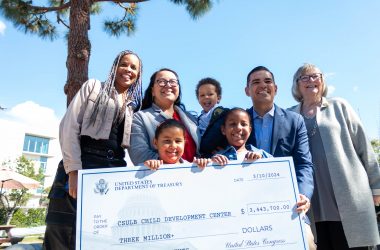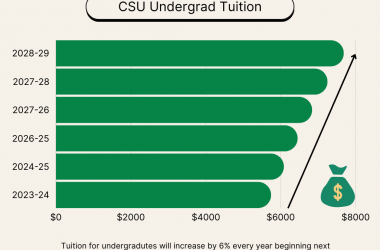Beneath the sounds of car horns and bass-filled rap music sits Chestnut Lot, an urban oasis owned by the apartment complex that overlooks the piece of land.
Among beds of peas and kale, avocado, citrus and banana trees fill the air with a musk scent of fresh produce.
“These are the best bananas in Long Beach,” Cal State Long Beach alumnus and creator of Foodscape Ryan Serrano said as he walked through mulch and fallen leaves in the plot.
Serrano started Foodscape shortly after receiving his degree in psychology in spring 2010. Chestnut Lot, which was started in 2011, serves as the main project in Foodscape.
“I’ve worked on different sustainable food projects, and I’ve done a lot of designing native habitats for residential areas,” Serrano said. “I wanted to sort of keep that food production stuff in Long Beach but not for profit.”
Serrano’s project came from what he called a “well-informed futility syndrome,” or rather, a period of depression.
“I had myself overeducated on global issues, social issues, economic injustice, everything,” he said. “All of that information is very dense and very heavy. It’s very intellectual and heady, but it doesn’t serve to exercise my need to feel less guilty because of all those things.”
After drowning himself in knowledge about food history and food security, Serrano said he made it his mission to act upon what he found was hurting society by sharing his knowledge and starting a community effort.
“I wanted to do something, and I did something ambitious I guess,” he said. “I founded an organization, and the premise is to find underused areas and turn them into food-producing areas and teach people how to do that work in the process and facilitate ways to share food and other food-oriented resources.”
Urban farming is nothing new to Downtown Long Beach. Former CSULB green and sustainability lecturer Kathleen Irvine has worked on other urban gardens, such as New City Farm and her current project, Chavez Park.
“It combines so many elements; by growing food, you can teach people … about nutrition, about ecology, about economy,” she said. “Whether it’s workforce development or you want to be a scientist or maybe you want to be an artist, there’s so many different avenues you can use that is based just on food. And by doing more of a community project, now it is not just you doing it alone. It’s a way of uniting people.”
Like most projects, Irvine said that urban farming also comes with challenges.
“It’s a very idealistic concept, but you really have to take into consideration human nature … that’s why farming is so difficult,” she said. “That’s why people left farming. They wanted to go to the city where it was easy to work.”
When entering a community effort, Irvine said that individuals have to realize human tendencies, which includes competition.
“It’s a great concept, but in reality people like to own things,” she said. “I think it’s very important that you maintain a sense of community when you have urban farming, and something that Ryan [Serrano] has like Foodscape, it’s very much a community idea.”
Every Thursday and Sunday at 9:30 a.m., Serrano, the apartment complex residents who own Chestnut Lot and additional volunteers come out to work on the farm.
“There’s always just impromptu lessons that end up happening,” he said. “A lot of people just really like the social aspects, because it’s all really awesome folks that come out and volunteer.”
Another reason why people come out to volunteer, Serrano said, is because it gives them a chance to step outside and enjoy the Southern California weather.
“So many people are starved to do manual work,” he said. “We are designed to use our ambulatory kind of power to do these kinds of things, but we are put in these unnatural places like cubicles or classrooms, and we are forced to sit for hours.”
The garden even comes complete with an area for socializing, which is situated in the entrance by an alleyway.
Apart from food security, Serrano said that the garden could help keep crime levels down, maintain health within the community and make people happy.
“It’s important for people to understand for their own sake what the state of our food system is, especially living in metropolitan and city areas, because people don’t understand that fossil fuels are a finite resource,” Serrano said.
CSULB graphic design junior Christina Cedeno said that she has never participated in a community garden. However, she said that she likes the ideas of getting involved, learning new lessons and working within a community.
“It would be great to learn how to plant and nourish the plants,” she said. “I think students could really benefit from growing their own food. It’s always great to have someone friendly to share their knowledge.”
Other than working on Chestnut Lot and Foodscape, Serrano hosts open mic night at Portfolio Coffee Shop, plays drums in the band Panther Heart and works as a landscaper. Future goals for Foodscape include building a stronger force of volunteers and finding more lots to turn into gardens.
“These are meager efforts … I would love to be able to feed everybody with this site, but the reality is there is just not enough space,” Serrano said. “I think that there is nothing more important than food security.”
To hear what Serrano has to say about Foodscape, listen to the podcast at www.daily49er.wpengine.com/podcasts.



